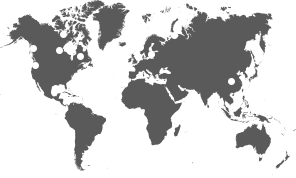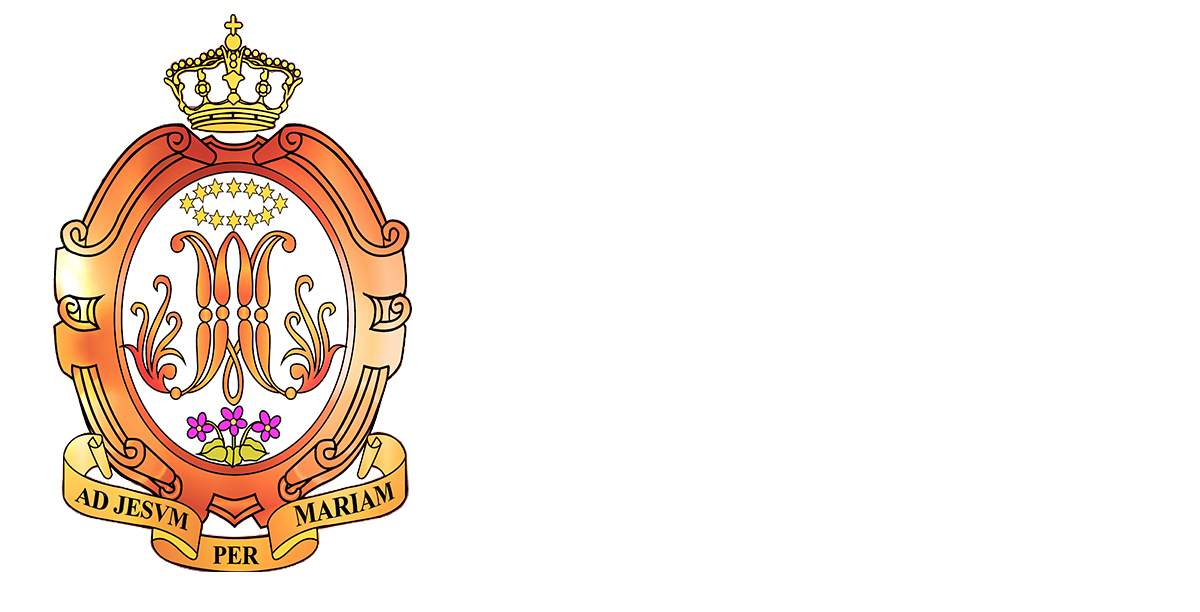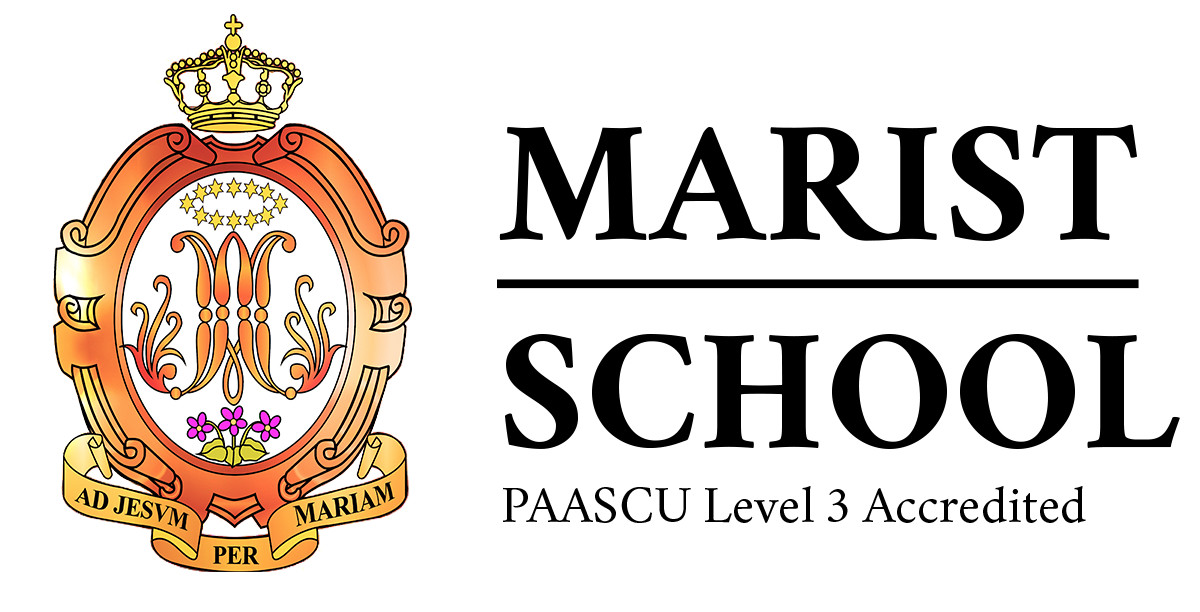- MARIST EDUCATION
- INSTITUTIONAL OBJECTIVES
- GRADE SCHOOL OBJECTIVES
- JUNIOR HIGH SCHOOL OBJECTIVES
- SENIOR HIGH SCHOOL OBJECTIVES
- CONTENT AND STRUCTURE
- CORE OF THE CURRICULUM
- THE CURRICULAR PROGRAM
- THE GRADE SCHOOL CURRICULUM
- THE JUNIOR HIGH SCHOOL CURRICULUM
- THE SENIOR HIGH SCHOOL CURRICULUM
- THE CO-CURRICULAR PROGRAMS
- ACCREDITATION
- ACADEMIC CALENDAR
MARIST EDUCATION
Marist School believes in the integrated development of the person wherein he/she is able to use his/her human faculties in order to find meaning in his/her existence.
The ability to use language in order to think and communicate effectively, to use mathematical knowledge and methods; to make use of technology and understanding its limitations; to express oneself through the arts and appreciate the artistic expression of others; to understand other cultures and live harmoniously amidst diversity; to apply knowledge of health, nutrition and physical ability; to acquire the capacity to meet unexpected challenges; to make informed value judgments; to recognize and to use one’s full learning potentials; to engage in life-long learning and live life with a sense of purpose and meaning, are considered important aspects of Marist education.
Institutional Objectives
In keeping with its philosophy of education and mission statement, Marist School aims for the total and balanced development of the physical, psychological, social, aesthetic, intellectual, moral and spiritual aspects of the individual pupils and students through the curricular, co-curricular and extra-curricular activities of the school. To achieve this, Marist School endeavors:
- to be faithful to St. Marcellin Champagnat’s charism of providing Christian Education to the youth, making Jesus known and loved, with particular attention to the poor;
- to form good Christians and virtuous citizens, men of character, persons learning how to live and how to make a living;
- to help pupils and students grow to be total persons who integrate human, Christian and Marial values with the benefits of their academic education;
- to cultivate in its graduates respect for human values as well as a personal interest in an active social and civic participation in the world around them; and
- to do all that is possible to get the pupils and students to realize their full potential and to help them acquire the knowledge, values, and skills they will need for personal development and professional advancement.
Grade School Objectives:
Specifically, the Marist Grade School aims to produce pupils who:
- appreciate their worth as persons and who in turn understand and appreciate others through the development of intrapersonal and interpersonal skills in interacting and reaching out to peoples in a multicultural and diverse setting;
- manifest good habits and show understanding of conditions necessary to maintain physical well-being through sports and athletic activities, proper nutrition, physical conditioning, hygiene, health and safety;
- exhibit their love for country and social consciousness with their knowledge of its history, culture, ideals, and needs; show concern for the welfare and dignity of their fellow citizens; and demonstrate respect for the law and duly constituted authorities;
- demonstrate mastery of basic communication, scientific, mathematical, technological skills, and exhibit a positive attitude towards the learning process and the value of life-long learning;
- show career awareness, vocational knowledge and a positive attitude towards work and the dignity of labor;
- display critical thinking and good judgment through an integral education that provides them opportunities to learn to use a set of standards in arriving at a decision;
- show a strong set of basic Christian, ethical and moral values such as self-discipline, honesty, respect, compassion, kindness, justice, peace, and respect for the integrity of creation;
- appreciate and express one’s self creatively through the arts and other art forms such as visual, literary, music and performing arts;
- apply in daily life their understanding and appreciation of the Catholic faith in relation to the family, school, Church, community and the bigger society.
Junior High School Objectives:
Specifically, the Marist Junior High School aims to form students who:
- exhibit critical and creative thinking through the development of their intellectual, technological, and problem-solving skills, habits, values, and attitudes.
- manifest proficiency in listening, speaking, reading, and writing through written and oral discourse.
- exhibit a healthy and physical well-being through a well-balanced sports, physical, and health education program.
- show appreciation for music, arts, and culture through exposure and performances.
- make informed decisions for the common good based on Christian faith and Marial virtues through religious education and varied learning situations.
- apply their academic proficiency and social skills through active participation in co-curricular activities and extra-curricular activities.
- show competence and readiness to engage in work and be productive contributors to national development
- participate actively in society as responsible Filipino citizens through awareness of local and global socio-economic and political issues and through involvement in community service activities; and,
- practice their Christian faith of believing, doing and trusting in pursuit of social justice, peace and respect for the integrity of creation.
Senior High School Objectives:
Specifically, the Marist Senior High School aims to form students who:
- exhibit autonomous, critical and creative thinking through the development of their academic, artistic, physical, and technical-vocational skills, habits, values, and attitudes.
- manifest proficiency in the analysis, synthesis and evaluation of ideas through research work and through written and oral discourse.
- engage themselves in a life of continuous learning for their personal development and for the transformation of others
- exhibit a healthy, physical outlook and well-being through a well-balanced sports, physical, and health education
- show appreciation for culture and the arts through theory and practice.
- make independent and informed decisions for the common good based on the tenets of their Christian faith and the Marial virtues through religious education.
- apply a wide array of educational competencies through active participation in co-curricular activities and extra-curricular activities.
- show competence and readiness to engage in work and be productive contributors to national development
- participate actively and harmoniously in society as responsible Filipino citizens in both local and global contexts through involvement in community service activities; and,
- practice the essence of their Christian faith of being and doing to effect social transformation through the pursuit of justice, peace and the integrity of creation.
CONTENT AND STRUCTURE OF THE PROGRAM
The structure of the curriculum is primarily based on the following:
- the acquisition of organized knowledge (religion, language, literature, mathematics, natural and physical sciences, history, geography, civics, economics and other social science subjects);
- development of intellectual skills (listening, speaking, reading, writing, calculating, problem solving, observing, measuring, estimating, exercising critical judgment and other more intellectual skills);
- enlargement of understanding of ideas and values (through discussion of new theories and literature analysis, involvement in activities of artistic and physical nature like music, drama, visual arts, health, nutrition, sports and others);
- acquisition of work skills and work ethics (food production, income generating activities, home technology, and other practical skills.).
THE CORE OF THE PROGRAM
The Religious Education Program and the Campus Ministry Program – The school considers Religious Education at the core of the curriculum. This program helps prepare the young to be truly committed to Christ through Mary in a progressive formation of faith, Christian values and community living. This includes the knowledge and understanding of man’s relationship with his God through the study of the scriptures and Church doctrines. This is attained through the various activities of the Campus Ministry Program such as basic religious instruction, recollections, retreats, bible sharing, liturgies, Marian devotions, value formation, and involvement in the activities of the local church.
THE CURRICULAR PROGRAM
In order to achieve the mission, goals and objectives of the Integrated Basic Education Program, the curricular program incorporates the following implementations:
The curricular programs include the academic offerings. Each subject area administers its own program covering the development of knowledge, skills, attitudes and values from kindergarten to senior high school.
The Communication Arts Program provides Marist students the necessary skills in Filipino and English in order for them to react intelligently and creatively to life situations.
The Mathematics Program involves the development of the students’ logical and mathematical thinking skills to help them understand and interpret the many aspects of modern society in a rapidly changing world.
The Natural Sciences and Technology Program helps students gain and develop scientific knowledge and attitude, master scientific processes and thinking, and acquire knowledge of the relationship between science, society, and the environment.
The Civics and Social Science Program endeavors to give in-depth treatment of social and historical learning content with the aim to make students enlightened and participative citizens in the socio-political life of the nation and the international community.
The Technology and Home Economics Programs covers the basic skills and concepts focusing on the resources available in the home, school and community in order to develop the students’ technical and occupational skills.
The Music, Arts, Physical Education, and Health Programs develops students’ capacity for music and arts expression and appreciation. Health concepts and physical activities provide opportunities for developing skills to live, to thrive, and to learn in the physical world .
THE GRADE SCHOOL CURRICULUM
- Kindergarten: Christian Living Education; Communication Arts (English, Reading, and Filipino); Mathematics; Music, Arts, Physical Education, and Health (MAPEH); Computer; and, Penmanship
- Grades 1 and 2: Christian Living Education; Communication Arts (English, Reading and Filipino); Araling Panlipunan; Mathematics; Computer; Music, Arts, Physical Education, and Health (MAPEH); and Penmanship
- Grades 3: Christian Living Education; Communication Arts (English, Reading, and Filipino); Mathematics; Science; Araling Panlipunan; Music, Arts, Physical Education, and Health (MAPEH); and, Computer
- Grades 4 – 6: Christian Living Education; Communication Arts (English, Reading, and Filipino); Mathematics; Science; Araling Panlipunan; Music, Arts, Physical Education, and Health (MAPEH); Technology and Livelihood Education (TLE); and, Computer
THE JUNIOR HIGH SCHOOL CURRICULUM
- Grade 7: Religion, Filipino, English, Mathematics, Science & Technology, Araling Panlipunan, Technology and Livelihood Education (T.L.E.: Home Economics, Entrepreneurship and Computer), and Physical Education, Health, and Music (PEHM)
- Grade 8: Religion, Filipino, English, Mathematics, Science & Technology, Araling Panlipunan, Technology and Livelihood Education (T.L.E.: Home Economics and Computer), and Physical Education, Health, and Music (PEHM)
- Grade 9: Religion, Filipino, English, Mathematics, Mathematics Elective, Science & Technology, Araling Panlipunan, Technology and Livelihood Education (T.L.E.: Electronics and Computer), and Physical Education, Health, and Music (PEHM)
- Grade 10: Religion, Filipino, English, Mathematics, Mathematics Elective, Science & Technology, Araling Panlipunan, Technology and Livelihood Education (T.L.E.: Electronics and Computer), and Physical Education, Health, and Music (PEHM)
THE SENIOR HIGH SCHOOL CURRICULUM
Grade 11 (Core Subjects)
| First Semester | Second Semester | |
| Religion | Awakening the Laity | Eco Spirituality |
| Filipino | Komunikasyon at Pagsasalita sa Wikang Filipino | Pagbasa at Pagsuri sa Iba’t Ibang Teksto |
| English | 21st Century Literature | Oral Communication |
| Science & Technology | Chemistry | Physics |
| Math | General Mathematics | Statistics and Probability |
| Social Science | Understanding Culture, Society, and Politics | Philippine Politics and Government |
| Computer | Computer Hardware Fundamentals | Web Development |
| Physical Education | Exercise for Fitness | Exercise for Fitness |
Grade 12 (Core Subjects)
| First Semester | Second Semester | |
| Religion | Christian Social Ethics | Christian Vocation |
| Filipino | Pagsulat ng Filipino sa Piling Larangan | Malikhaing Pagsulat |
| English | English for Academic Purpose | Media and Information Literacy |
| Science & Technology | Life Science | Biology |
| Math | Advanced Mathematics | Advanced Mathematics |
| Social Science | Introduction to Philosophy | Personal Development |
| Computer | Program Logic Development | Game Development |
| Physical Education | Exercise for Sports and Recreation | Exercise for Sports and Recreation |
THE CO-CURRICULAR PROGRAMS
The Co-curricular Programs are essential to the balanced formation and development of pupils and students. They supplement the learning taking place in the classrooms. Clubs and organizations such as the Dramatics Club, Math Club, Dance Club, etc. are beneficial venues for individual development with the guidance of club moderators and advisers.
Enrichment Program: This program provides opportunities and experiences for talented pupils and students to develop their unique and particular skills in varying depths of curriculum exploration. Through programs like creativity periods, self-learning activities, off-campus activities, researches, etc., they are given the opportunity to excel and develop their innate talents.
Remedial Program: Giving attention to the least-favored is one of the choice qualities of Marist education. To manifest this, the school offers remedial classes where slow learners and the academically challenged are given help.
Guidance Services Program: The school believes in the importance of the individuality of the person. Through the guidance services, the school assists individual pupils and students in developing their potentials by gaining accurate self-concepts, self-confidence, and a personal sense of independence.
Sport Development Program: Sports activities are avenues for character formation. Through sports, the learner is developed to become a team player and at the same time, a disciplined individual. A sound body facilitates a sound mind and spirit. The school achieves this through a comprehensive campus-based sports development program where all sectors of the Marist community are involved..
Leadership Training Program: The ideal Marist graduate possesses leadership qualities of self-confidence, loyalty, respect, initiative and service. The school ensures this by offering training activities that build the students’ capacity for leadership and service.
Community Outreach Program: To foster the spirit of service to community, civic consciousness, and social awareness, the Community Outreach Program facilitates activities that provide students with the actual and personal experience of engaging with people especially the less-favored members of society.
ACCREDITATION
Marist School makes all effort toward providing quality education for the youth in its care. One of the ways that the school seeks to do this is through accreditation, a process of self-assessment aided by the objective evaluation of peer schools. Accreditation ensures that the school consistently implements a curriculum that well beyond the minimum requirements set by government regulation, thereby ensuring quality education.
After gaining membership in the Philippine Accrediting Association of Colleges and Universities (PAASCU) with a preliminary survey in 1982, Marist School was formally visited for evaluation in 1984 (HS) and 1987 (GS). Since then, resurveys have been conducted every five (5) years. On November 28, 2008, the Federation of Accrediting Agencies of the Philippines (FAAP) granted both grade school and high school departments Level III accreditation, the highest level of accreditation for basic education.
Below are the dates of PAASCU re-survey visits:
| VISIT | GRADE SCHOOL | HIGH SCHOOL |
| Preliminary Visit | August 23-25, 1982
SY 1982-1983 |
August 18-20, 1982
SY 1982-1983 |
| Formal Survey | February 21-23, 1987
SY 1986-1987 |
February 27-29, 1984 SY 1983-1984 |
| 1st Re-survey | February 14-16, 1990
SY 1989-1990 |
August 5-7, 1987 SY 1987-1988 |
| 2nd Re- Survey | February 15-16, 1995
SY 1994-1995 |
November 23-24, 1992 SY 1992-1993 |
| 3rd Re- Survey | February 10-11, 2000
SY 1999-2000 |
November 11-12, 1997 SY 1997-1998 |
| 4th Re-Survey | November 23-24, 2005
SY 2005-2006 |
November 20-21, 2002 SY 2002-2003 |
| Level III Application | September 8, 2008 | September 8, 2008 |
| 5th Re-Survey | November 21-22, 2011
SY 2011-2012 |
November 21-22, 2007 SY 2007-2008 |
| 6th Re-Survey | January 18-19, 2017
SY 2016-2017 |
November 18-19, 2013 SY 2013-2014 |
| 7th Re-Survey |
SY 2021-2022 |
November 21-22, 2019 SY 2019-2020 |



